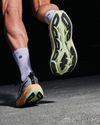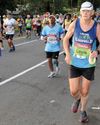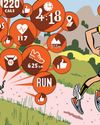Just drink plenty, right? Not so fast.

SHALANE FLANAGAN CAN’T remember much about finishing the 2016 US Olympic Marathon Trials in Los Angeles. She had led much of the race with teammate Amy Cragg, but the temperature reached 23 degrees on the unshaded course in winter, the hottest Marathon Trials on record. Flanagan, who trains in the cool and rainy Pacific North-West, wasn’t acclimated to that kind of heat. She staggered through the last few kilometres, feeling dizzy, getting chills, hearing ringing in her ears. Though she hung on to finish third and secure a spot on the US Olympic Marathon Team, she collapsed and was rushed to a medical tent, where she was hooked up to an IV. “I’d been taking my fluids, but I could just tell that they weren’t really absorbing,” she told Runner’s World the day after the race. “It was absolutely an overheating and dehydration problem.”
On the surface, hydration seems so simple: just drink enough, duh! But if pro runners struggle – and they have a team of experts dialling in their every need – then the hydration calculus is obviously more complex. “You have to factor in heat, humidity, acclimation, altitude, intensity level, and how much you drank before you ran, in addition to your individual sweat rate,” says dietician Lauren Antonucci, owner of Nutrition Energy. “Everyone’s needs are different.”
Hydration Status
Sweat reduces your blood volume, which makes your heart work harder. Becoming dehydrated by more than 2 to 3 per cent may slow you down; a dehydration rate of greater than 4 per cent may land you in a medical tent.
Diese Geschichte stammt aus der October 2018-Ausgabe von Runner's World SA.
Starten Sie Ihre 7-tägige kostenlose Testversion von Magzter GOLD, um auf Tausende kuratierte Premium-Storys sowie über 8.000 Zeitschriften und Zeitungen zuzugreifen.
Bereits Abonnent ? Anmelden
Diese Geschichte stammt aus der October 2018-Ausgabe von Runner's World SA.
Starten Sie Ihre 7-tägige kostenlose Testversion von Magzter GOLD, um auf Tausende kuratierte Premium-Storys sowie über 8.000 Zeitschriften und Zeitungen zuzugreifen.
Bereits Abonnent? Anmelden

LONGOVERDUE PRAISE FOR THE RUNNING SINGLET
In the last decade, the running singlet once reserved for amateur competitors and professional athletes - has gone mainstream, not only on race day but also on everyday runs.

RISE OF THE 'ILLEGAL RUNNING SHOES
Banned shoes emerged at a basketball court long before they found their way onto a marathon course.

CRACKING THE SLEEP CODE
Are you an early bird or a night owl? Perhaps you've assigned yourself another animal after completing an internet quiz. Research is shedding light on the link between well-being and circadian predisposition, but there's no need to rewire yourself. Learn to lean into your biology with our guide.

THE SECRET TO SPEED IS IN YOUP BLOOD
Some of the world's best runners credit this unorthodox Norwegian training method for their success. Is it right for you?

THE MIND OF MASSYN
IN 2024, LOUIS MASSYN WILL ATTEMPT HIS 49TH COMRADES MARATHON AND HE'S LEARNT PLENTY OF LESSONS ALONG THE WAY. HERE'S THE STORY OF HIS AMAZING JOURNEY.

TAKING CHARGE
OUTSPOKEN AND AMBITIOUS, NEW COMRADES RACE MANAGER (AND FORMER WINNER) ANN ASHWORTH IS LOOKING TO TAKE THE RACE INTO THE FUTURE.

A HALF CENTURY OF COMRADES
THIS YEAR, BARRY HOLLAND WILL BE AIMING TO FINISH HIS 50TH CONSECUTIVE COMRADES MARATHON. THIS IS WHAT HAS INSPIRED HIM.

MY RUNNING LIFE
ORDINARY RUNNERS doing EXTRAORDINARY THINGS

Ageing In The Age Of Strava
RECENTLY MY BUDDY Sean sent a text message that said, “Been running a lot of 5:30–6:00 kays early. It feels pretty nice at that pace.”

How To Start A Run When You Don't Feel Like It
I'VE ALWAYS FELT validation when reading a story about writers and their love of procrastination.